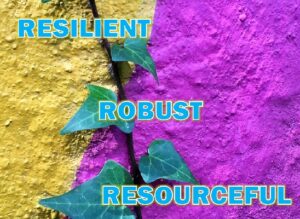
In the realm of project management, effective risk management is a crucial factor that can make or break the success of any endeavor. By identifying potential risks and devising strategies to mitigate them, project risk management ensures that projects stay on track and deliver the desired outcomes. In this blog post, we will explore three essential characteristics that begin with the letter “R” , resilient, resourceful, robust and how they form the pillars of project risk management.
1. Resilient Project Risk Management: Embracing challenges with tenacity and adaptability, project teams navigate uncertainties and setbacks with resilience, ensuring project success in the face of adversity.
2. Resourceful Project Risk Management: Leveraging available resources intelligently, project managers creatively address risks and seize opportunities, optimizing project outcomes within constraints.
3. Robust Project Risk Management: Establishing a sturdy risk management framework, project teams can proactively identify, assess, and respond to risks, bolstering project resilience and ensuring its alignment with objectives throughout its lifecycle.
1. Resilient Project Risk Management: Navigating Challenges with Fortitude
Resilience is a quality that every project manager should possess. In the face of uncertainties, setbacks, or unexpected obstacles, a resilient project risk management approach allows project teams to bounce back and adapt to changing circumstances. A resilient project manager anticipates potential risks and prepares contingency plans to address them swiftly. By fostering a culture of adaptability and continuous improvement, project teams can face challenges with fortitude, viewing them as opportunities to learn and grow. Resilience enables project managers to make informed decisions, take calculated risks, and steer the project towards success, even in the most challenging circumstances.
Example: A project manager overseeing the development of a software product encounters shared resources among multiple projects, which leads to delays in acquiring the necessary technical expertise. Additionally, a production issue arises when a crucial server malfunctions, affecting the project timeline. Resilience Strategy: The project manager acknowledges the resource constraints and promptly collaborates with other project managers to find an innovative solution. They foster open communication between teams, allowing shared resources to be allocated efficiently, mitigating delays. For the production issue, the project manager engages the IT team to resolve the server problem swiftly, leveraging their network to minimize its impact on project activities.
2. Resourceful Project Risk Management: Unleashing Creativity to Overcome Obstacles
Resourcefulness is a hallmark of effective project risk management. It involves making the most of available resources, such as budget, time, and expertise, to address risks and seize opportunities. Resourceful project managers think outside the box, seeking innovative solutions that optimize resources while managing risks effectively. In the context of project risk management, resourcefulness also means leveraging data and insights to make informed decisions. Utilizing risk assessment tools, historical project data, and lessons learned from previous projects empowers project teams to proactively identify and manage risks. A resourceful approach to project risk management maximizes the chances of project success by harnessing available resources to their full potential.
Example: The bank's international visa debit card project implementation faces a sudden delay in receiving the required chip technology from the vendor due to supply chain disruptions. This unforeseen challenge jeopardizes the project's timeline and risks disappointing customers eagerly waiting for the new service. Resourcefulness Strategy: The project manager, displaying resourcefulness, quickly assesses the situation and identifies alternative chip technology vendors with available stock. They initiate communication with these vendors and negotiate an expedited delivery agreement to secure the required chips promptly. Simultaneously, the project manager engages the bank's internal technology team to explore potential in-house chip production capabilities. This innovative approach ensures that the project can continue even if external vendors face prolonged delays.
3. Robust Project Risk Management: Building a Foundation for Project Success
Robust project risk management serves as a solid foundation for project success. It involves the development of a comprehensive risk management plan that identifies, analyzes, and responds to risks throughout the project lifecycle. A robust risk management framework aligns with project objectives and considers potential risks at each stage, from initiation to completion. A robust approach to project risk management includes proactive risk monitoring and regular reassessment of risk response strategies. By conducting periodic risk reviews, project teams can ensure the relevance and effectiveness of risk mitigation efforts. A robust risk management framework allows project managers to make well-informed decisions, mitigating potential threats and capitalizing on opportunities, thus increasing the likelihood of project success.
Example: A project manager is responsible for a construction project. Despite diligent planning, the project faces de-prioritization of project activities by stakeholders due to unforeseen budget constraints and shifting organizational priorities. Robustness Strategy: The project manager demonstrates robust project risk management by conducting an in-depth risk assessment and identifying alternative funding options. They collaborate with stakeholders to highlight the project's long-term benefits and present a revised project timeline that aligns with the organization's new priorities. This robust approach enables the project manager to secure continued support and deliver a successful project within the revised constraints.
In the dynamic world of project management, risk management is a cornerstone that underpins project success. Embracing the three pillars of project risk management – resilience, resourcefulness, and robustness – project managers can steer their teams towards achieving project objectives, even in the face of uncertainty. Resilience enables project teams to navigate challenges with strength and adaptability. Resourcefulness empowers project managers to optimize available resources and creatively address risks. Robustness forms a solid foundation, ensuring that the risk management approach is comprehensive, proactive, and continually aligned with project goals. By incorporating these three vital characteristics into their project risk management practices, project managers can effectively manage risks, overcome obstacles, and set the stage for successful project delivery. In the ever-evolving landscape of project management, embracing resilience, resourcefulness, and robustness will undoubtedly lead to triumph in every project endeavor.
As a bonus, check out the PMI.org article on How To Manage The Risks You Didn't Know You Were Taking
